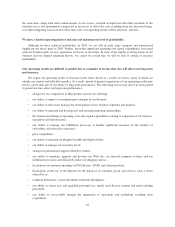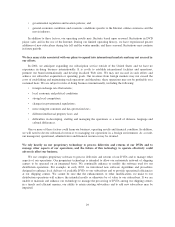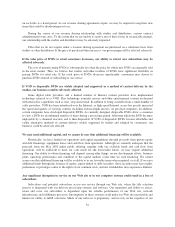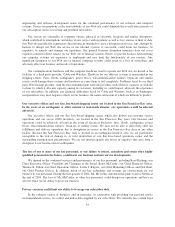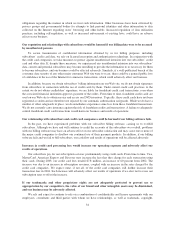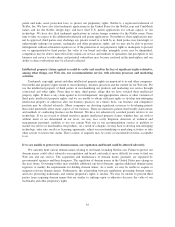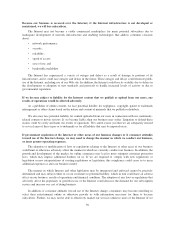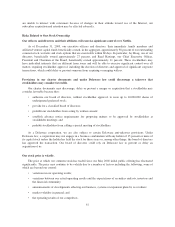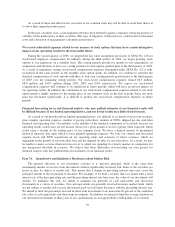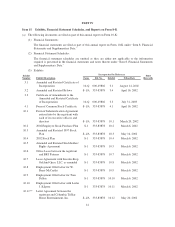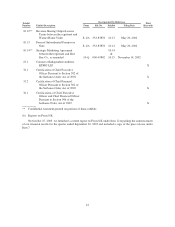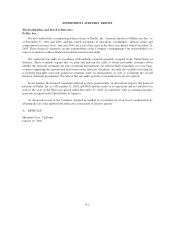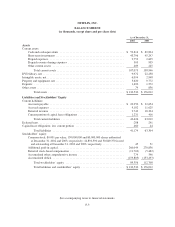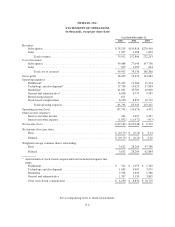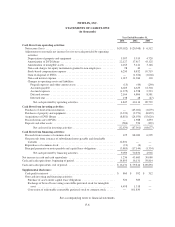NetFlix 2003 Annual Report Download - page 54
Download and view the complete annual report
Please find page 54 of the 2003 NetFlix annual report below. You can navigate through the pages in the report by either clicking on the pages listed below, or by using the keyword search tool below to find specific information within the annual report.As a result of these and other factors, investors in our common stock may not be able to resell their shares at
or above their original purchase price.
In the past, securities class action litigation often has been instituted against companies following periods of
volatility in the market price of their securities. This type of litigation, if directed at us, could result in substantial
costs and a diversion of management’s attention and resources.
We record substantial expenses related to our issuance of stock options that may have a material negative
impact on our operating results for the foreseeable future.
During the second quarter of 2003, we adopted the fair value recognition provisions of SFAS No. 123 for
stock-based employee compensation. In addition, during the third quarter of 2003, we began granting stock
options to our employees on a monthly basis. The vesting periods provide for options to vest immediately, in
comparison with the three to four-year vesting periods for stock options granted prior to the third quarter of 2003.
As a result of immediate vesting, stock-based compensation expenses determined under SFAS No. 123 is fully
recognized in the same periods as the monthly stock option grants. In addition, we continue to amortize the
deferred compensation of stock options with three to four-year vesting periods granted prior to the third quarter
of 2003 over the remaining vesting periods. Our stock-based compensation expenses totaled $6.3 million,
$8.8 million and $10.7 million during 2001, 2002 and 2003, respectively. We expect our stock-based
compensation expenses will continue to be significant in future periods, which will have an adverse impact on
our operating results. In addition, the calculation of our stock-based compensation expenses related to our stock
option grants is highly sensitive to the market price of our common stock on the date of grant. Since our stock
price has fluctuated significantly, it is difficult to predict our stock-based compensation expenses in future
periods.
Financial forecasting by us and financial analysts who may publish estimates of our financial results will
be difficult because of our limited operating history, and our actual results may differ from forecasts.
As a result of our growth and our limited operating history, it is difficult to accurately forecast our revenues,
gross margin, operating expenses, number of paying subscribers, number of DVDs shipped per day and other
financial and operating data. Our inability or the inability of the financial community to accurately forecast our
operating results could cause our net income (losses) in a given quarter to be less (greater) than expected, which
could cause a decline in the trading price of our common stock. We have a limited amount of meaningful
historical financial data upon which to base planned operating expenses. We base our current and forecasted
expense levels and DVD acquisitions on our operating plans and estimates of future revenues, which are
dependent on the growth of our subscriber base and the demand for titles by our subscribers. As a result, we may
be unable to make accurate financial forecasts or to adjust our spending in a timely manner to compensate for
any unexpected shortfalls in revenues. We believe that these difficulties in forecasting are even greater for
financial analysts who may publish their own estimates of our financial results.
Item 7A. Quantitative and Qualitative Disclosures about Market Risk
The primary objective of our investment activities is to preserve principal, while at the same time
maximizing income we receive from investments without significantly increased risk. Some of the securities we
invest in may be subject to market risk. This means that a change in prevailing interest rates may cause the
principal amount of the investment to fluctuate. For example, if we hold a security that was issued with a fixed
interest rate at the then-prevailing rate and the prevailing interest rate later rises, the value of our investment will
decline. To minimize this risk, we intend to maintain our portfolio of cash equivalents and short-term
investments in a variety of securities. Our cash equivalents are generally invested in money market funds, which
are not subject to market risk because the interest paid on such funds fluctuates with the prevailing interest rate.
We intend to limit the percentage invested in short-term investments to no more than 50 percent of the combined
fair value of cash equivalents and short-term investments. In addition, we intend to limit the average duration on
our short-term investments to three years or less and maintain an average portfolio credit quality of A or better.
38


